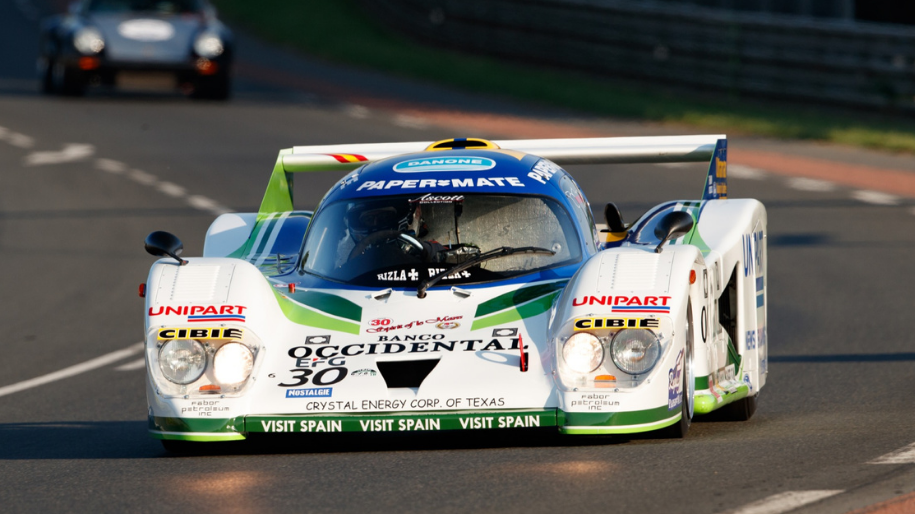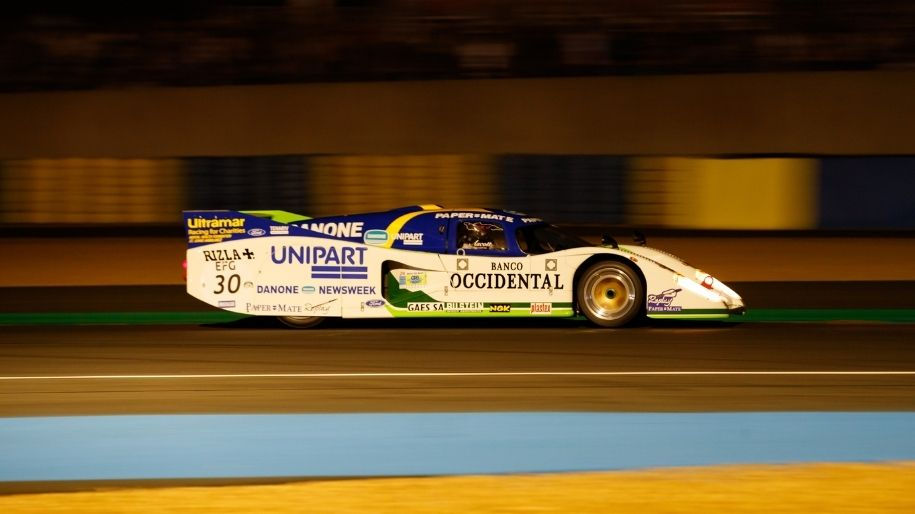1981 LOLA T600 COSWORTH HU3
-
The first ground effect prototype that foreshadowed the advent of Group C
-
An extremely strong competitor - It won two rounds of the Endurance World Championship in 1981
-
The only ground effect prototype eligible for Classic Endurance Racing and Le Mans Classic Grid 6
-
Increased safety thanks to a solid chassis made of aluminium honeycomb and the roll cage
-
Unmolested as it has not been raced for 37 years - Restored in 2017
ELIGIBILITY
TECHNICAL SPECIFICATIONS
CLASSIC ENDURANCE RACING by PETER AUTO
LE MANS CLASSIC
DAYTONA CLASSIC 24 HOUR by HSR
ROLEX MONTEREY MOTORSPOSTS REUNION
SEBRING CLASSIC 12 HOUR by HSR
Mark
LOLA
Model
T600
Year
1981
Chassis number
HU3
Frame
ALUMINIUM HONEYCOMB
Body
FIBERGLASS
Engine
COSWORTH DFL V8 3.3 LITERS
Power
480 CH. @ 10,000 RPM
Gearbox
HEWLAND DG 300 - 5 SPEED
Weight
850 KG

Ascott Collection is proud to offer for sale the 1981 LOLA HU3, a very important car from a historical viewpoint, that marked a technological breakthrough in the world of motor racing. In the year of its launch, the car won two rounds of the Endurance World Championship in Europe, while Brian Redman won the IMSA title in the USA with a T600 powered by a Chevrolet engine.
Among the innovative elements of this unique prototype are the ground effect diffuser, which was to become very widely used, and the aluminum honeycomb used to make its chassis, which is also fitted with a roll bar. With the LOLA T600, performance and safety made a leap forward. These technological advances would then serve as a basis for developing many other prototypes. In fact it was a Group C car ahead of its time!
Powered by a 3.3-litre Ford Cosworth engine, HU3 is the only LOLA T600 to have the privilege of being fitted with this F1-derived powertrain. Having been entered for the 24 Hours of Le Mans in 1981, it is therefore eligible to compete in the Le Mans Classic, in Class 6. HU3 remained unused for 37 years before being acquired and restored by Ascott Collection in 2017. The sale of this LOLA T600 HU3 offers you the opportunity to acquire a unique one-off car.
The T600 revolutionized the sports car racing
While Lola had built the open cockpit T-510 ground effect Can Am car for 1980, the T-600 closed car was entirely new, though both were to be powered by a Chevrolet V8 (6 liter in the T600, 5 liter in the T510). Still, there was no interchangeability between Lola's two customer road racers. The T510 was a conventional chassis design constructed of riveted aluminium sheet. The Lola T600 was to have a honeycomb aluminium chassis, a first for Lola, giving it greater strength than its Can Am cousin.
First Ground-effect prototype inspired by Max Sardou
The GTP series offered opportunities for exploring new technologies. Broadley approached the leading independent expert on ground effects, Dr. Max Sardou. In 1973, while exploring the vaporization of the Venturi in a carburetor, Sardou saw the significance of the internal winglike shape that caused the air to lose pressure when the throat enlarged.
Design for the T600 began in the fall of 1980, with the first car ready by spring. Using Sardou's theories, the car featured rear wheel covers and suspension components tucked out of the venture air stream to maximize down force. Since the car had no side skirts, as used on Formula 1 cars at the time, air was able to enter from the sides, and down force was actually increased as the car slid.
In Europe, Guy Edwards and Emilio de Villota won two races of the World Championship of 1981 with HU3
In Europe, Eric Broadley knows his revolutionary car can be very competitive. The Britannic Guy Edwards teams up with Emilio de Villota to enter a T600 in the World Endurance Championship. HU3 will be the LOLA factory car for the 1981 season, supported by Cosworth Engineering. HU3 will be powered by a Cosworth V8, coming from the Formula 1. Cosworth Engineering will bring its technical and human support to HU3. The capacity of the engine will be increased from 3 l to 3.3 l, during the season. The light and powerful engine finds easily its place above the tunnels which bring to the LOLA its revolutionary architecture.
HU3 has set new standards for endurance cars
In 1981, the LOLA HU3 is a car very ahead of the competition. Among the unique elements, we can obviously mention the ground effect which is a technique that will never be questioned. Nowadays, no racing car is designed without a diffuser.
The use of aluminum honeycomb is also an innovation. This lightweight material offers much better rigidity than aluminum sheet. Moreover, in case of an accident, it is much safer for the pilot. Like the diffusers, the use of aluminum honeycomb will be generalized in Group C, before carbon fiber comes to replace it.
A very successful endurance prototype
After the development of the LOLA T600, Edwards and de Villota play the troublemakers. At the 6 hours of Monza, they qualify in 5th position and have to give up in race on a failure of transmission.
At the next race, they qualify in second position, just behind the Porsche 936 of Team Joest driven by German drivers including Jochen Mass. The LOLA T600 is in the lead of the race before having to give up due to a fuel failure. A very good start. In the next race, the 1000 km of Nurburgring, HU3 finished in 8th position and won the GTP category.
At the 24 Hours of Le Mans, HU3 suffered a gearbox problem on the first lap! She finished the race in 15th position.
In the wake of the 24 Hours of Le Mans, the LOLA T600 HU3 is entered in the 6 Hours of Enna Pergusa in Italy. It is the first victory. A second victory will be secured at the 1000 km of Brands hatch. At the end of a successful season, HU3 is sold to a Japanese collector
A unique piece, eligible in the most prestigious events
The LOLA T600 HU3 did not race for 37 years. Acquired in 2017 by Ascott Collection in original condition, it was fully restored and made its return to the track as part of the Classic Endurance Racing 2 by Peter Auto and Le Mans Classic 2018.
This LOLA T600 is a unique piece. Rare, powerful and historically important, it marked a turning point in endurance car design and won two rounds of the World Endurance Championship in 1981.



























